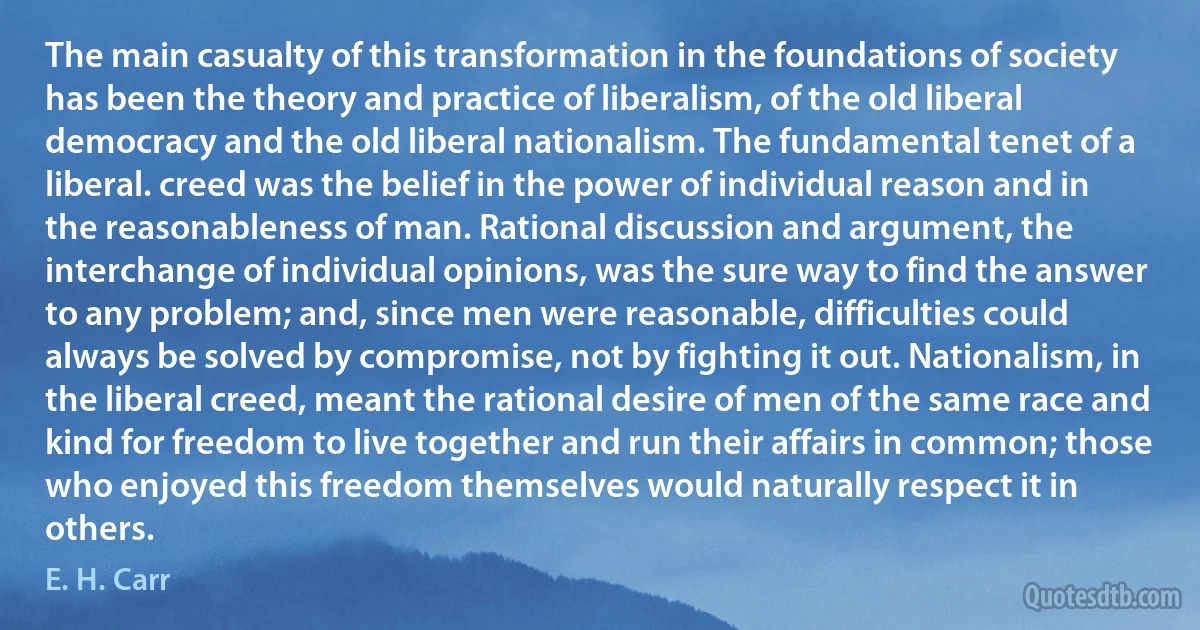
The main casualty of this transformation in the foundations of society has been the theory and practice of liberalism, of the old liberal democracy and the old liberal nationalism. The fundamental tenet of a liberal. creed was the belief in the power of individual reason and in the reasonableness of man. Rational discussion and argument, the interchange of individual opinions, was the sure way to find the answer to any problem; and, since men were reasonable, difficulties could always be solved by compromise, not by fighting it out. Nationalism, in the liberal creed, meant the rational desire of men of the same race and kind for freedom to live together and run their affairs in common; those who enjoyed this freedom themselves would naturally respect it in others.
E. H. CarrRelated topics
answer argument casualty common compromise creed desire difficulties fighting find freedom fundamental interchange men kind liberalism live man mean nationalism power practice problem race reason reasonableness respect run sure tenet transformation way affairs othersRelated quotes
Nature, or to speak in more Christian fashion, God, the common Father of men, from the outset gave equal rights to all his children to all the things they needed to preserve their lives. None of us can boast of being more privileged than the rest by nature; but through the insatiable desire to amass wealth, it became impossible for this beautiful brotherhood to endure for long in the world. Men had to resort to division and possession, which resulted in constant quarrels and litigation; of this were born the words 'mine' and 'thine'-such cold terms, as the admirable St. John Chrysostom remarks-of this, too, was born the great diversity of conditions, some living in affluence in every respect, others languishing in penury.

Jacques-Bénigne Bossuet
...what would be most extraordinary is this, that anybody who considered the state of the Liberal party then [1896] and now should expect me voluntarily to return to the Liberal party. (Laughter.) I left the Liberal party because I found it impossible to lead it, in the main owing to the divisions to which I referred in my letter. (Hear, hear.) The Liberal party in that respect is no better now, but rather worse; and it would indeed be an extraordinary evolution of mind if, after having left the Liberal party on that ground, I were to announce my intention of voluntarily returning to it in its present condition. No, gentlemen, so far as I am concerned, I must repeat what I have said on that subject in all my speeches, that for the present, at any rate, I must proceed alone. I must plough my furrow alone.

Archibald Primrose, 5th Earl of Rosebery
Right wrongs no man. If respect is had to majorities, the fact that only one-fifth of the population of the globe is white and the other four-fifths are colored, ought to have some weight and influence in disposing of this and similar questions. It would be a sad reflection upon the laws of nature and upon the idea of justice, to say nothing of a common Creator, if four-fifths of mankind were deprived of the rights of migration to make room for the one-fifth. If the white race may exclude all other races from this continent, it may rightfully do the same in respect to all other lands, islands, capes and continents, and thus have all the world to itself, and thus what would seem to belong to the whole would become the property of only a part. So much for what is right, now let us see what is wise.

Frederick Douglass
In all countries and in all historical times there have been individuals to whom multitudes have looked for guidance in religion. Buddha, Lao Tse, Confucius, Moses, Zoroaster, Shankara, Jesus, Muhammed, Joseph Smith, and Mary Baker Eddy were such individuals. New examples are to be found within the lives of many of us. Pure democracy or sheer equalitarianism in religious matters is not to be expected of our human nature. Some distinction between leaders or founders and followers or disciples seems to be our destiny. But there is a question of degree, or of qualification. To what extent, or under what conditions, are some individuals, or perhaps is some unique individual, worthy of trust in religious matters? It is in the answer to this question that mistakes can be made.

Charles Hartshorne
I've come to assert that I am a judge and I will not be consigned the unquestioned opinions of others. But even more than that, I have come to say that isn't it time to move on? Isn't it time to realize that being angry with me solves no problems? Isn't it time to acknowledge that the problem of race has defied simple solutions and that not one of us, not a single one of us can lay claim to the solution? Isn't it time that we respect ourselves and each other as we have demanded respect from others? Isn't it time to ignore those whose sole occupation is sowing seeds of discord and animus? That is self-hatred. Isn't it time to continue diligently to search for lasting solutions? I believe that the time has come today. God bless each of you, and may God keep you.

Clarence Thomas
